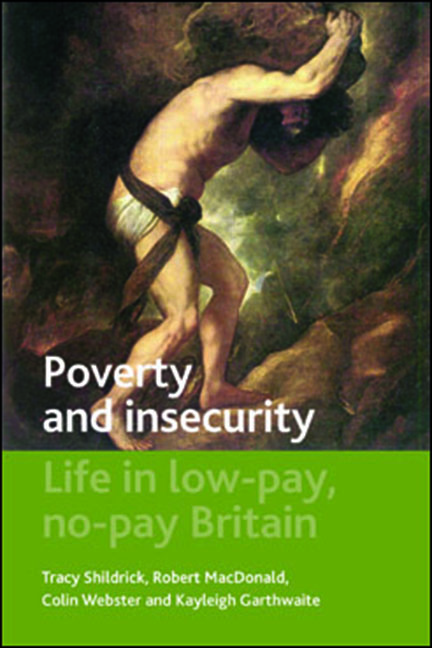Book contents
- Frontmatter
- Contents
- List of figures and boxes
- Acknowledgements
- 1 Introduction
- 2 Poor work, welfare and poverty
- 3 Researching the low-pay, no-pay cycle and recurrent poverty
- 4 The low-pay, no-pay cycle: the perspectives and practices of employers and ‘welfare to work’ agencies
- 5 The low-pay, no-pay cycle: its pattern and people's commitment to work
- 6 Searching for jobs: qualifications, support for the workless and the good and bad of informal social networks
- 7 Poor work: insecurity and churning in deindustrialised labour markets
- 8 ‘The ties that bind’: ill health and caring and their impact on the low-pay, no-pay cycle
- 9 Poverty and social insecurity
- 10 Conclusions
- References
- Index
4 - The low-pay, no-pay cycle: the perspectives and practices of employers and ‘welfare to work’ agencies
Published online by Cambridge University Press: 07 September 2022
- Frontmatter
- Contents
- List of figures and boxes
- Acknowledgements
- 1 Introduction
- 2 Poor work, welfare and poverty
- 3 Researching the low-pay, no-pay cycle and recurrent poverty
- 4 The low-pay, no-pay cycle: the perspectives and practices of employers and ‘welfare to work’ agencies
- 5 The low-pay, no-pay cycle: its pattern and people's commitment to work
- 6 Searching for jobs: qualifications, support for the workless and the good and bad of informal social networks
- 7 Poor work: insecurity and churning in deindustrialised labour markets
- 8 ‘The ties that bind’: ill health and caring and their impact on the low-pay, no-pay cycle
- 9 Poverty and social insecurity
- 10 Conclusions
- References
- Index
Summary
Introduction
The prime aim of the study was to understand recurrent poverty and its connection to the low-pay, no-pay cycle on the basis of accounts gathered from those engaged in this cycle. We also, however, sought to investigate the perspectives and practices of, first, local employers in Teesside who might offer jobs to people such as the interviewees and, second, of those agencies that seek to help people from ‘welfare to work’. We were interested in exploring their views about local worklessness and what might cause people to become caught up in the low-pay, no-pay cycle. As noted in Chapter 3, we interviewed 10 employers, representing larger (for example, the local university and a major supermarket chain) and smaller organisations (for example, a corner shop, a hair salon, a care home). We interviewed 13 people who worked for statutory or voluntary sector agencies whose remit included assisting unemployed people into jobs in Middlesbrough (for example, Jobcentre Plus, employment support agencies, housing associations).
There was a strong level of agreement between employers and welfare to work agencies in respect of their perspectives on what might explain local worklessness and the low-pay, no-pay cycle. For this reason we have presented their comments together in this chapter. Using the terminology that is common in policy and practice in respect of worklessness, the bulk of the chapter is organised around what these interviewees perceived as the ‘barriers’ to employment for local people. After this we briefly discuss the extent to which the ‘barriers’ perceived by employers and support agencies matched the experiences and perspectives of local people who were in or looking for jobs, as revealed by interviews with those in the low-pay, no-pay cycle. We begin, however, with a discussion of the role and situation of welfare to work agencies.
Activities of welfare to work agencies
It is an understatement to note that welfare to work agencies face a substantial challenge in seeking to help people into jobs in a local economy that has undergone severe deindustrialisation – and at a time of national economic recession and high and rising local unemployment. By definition, their activities are almost wholly geared towards the supply side of the labour market (that is, improving people's ‘employability’ and overcoming perceived ‘barriers’ to employment that individuals might have in their lives).
- Type
- Chapter
- Information
- Poverty and InsecurityLife in Low-Pay, No-Pay Britain, pp. 61 - 78Publisher: Bristol University PressPrint publication year: 2012



